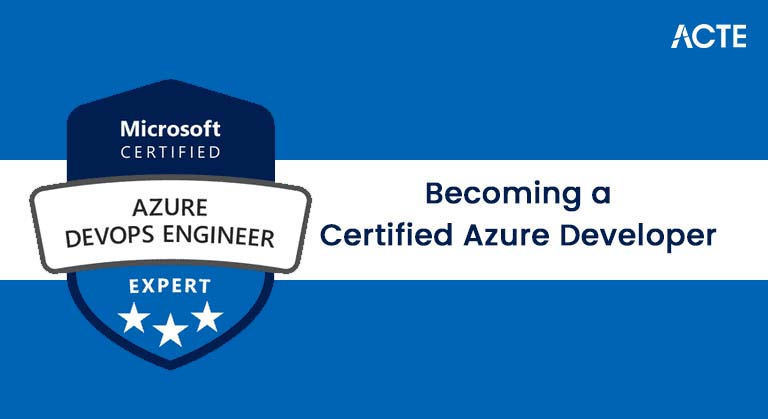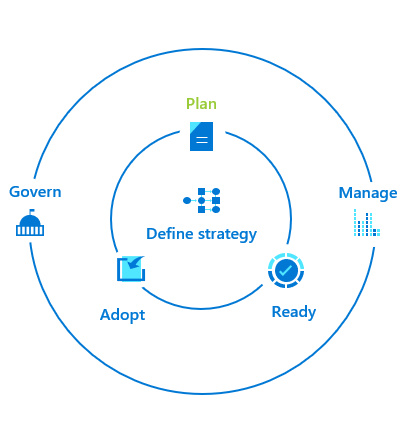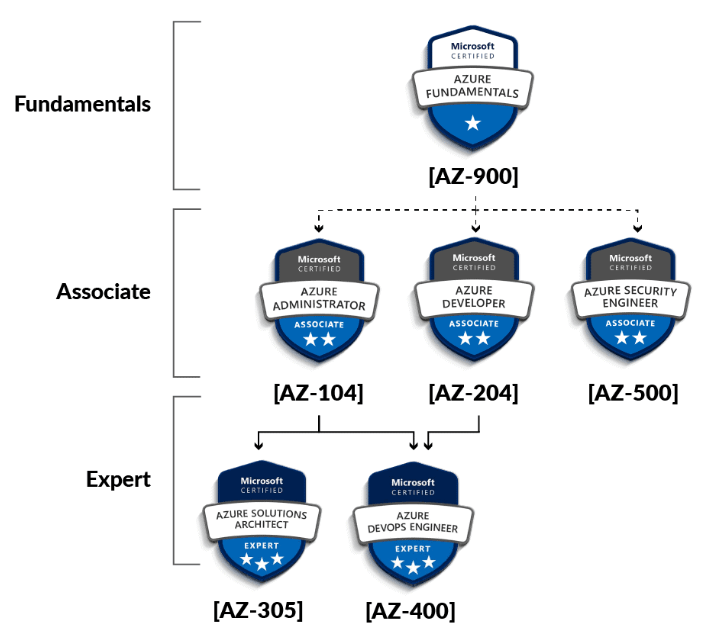
- Introduction to Azure Development
- Roles and Responsibilities of an Azure Developer
- Prerequisites and Required Skills
- Microsoft Azure Certifications
- Learning Path for Azure Development
- Hands-on Experience and Projects
- Best Resources to Learn Azure Development
- DevOps and CI/CD in Azure
- Cloud Security Best Practices
- Job Opportunities and Career Growth
- Salary Trends for Azure Developers
- Conclusion
Introduction to Azure Development
Microsoft Azure is one of the leading cloud platforms globally, offering a wide range of cloud services such as computing, analytics, storage, and networking. Azure development refers to building, deploying, and managing applications and services on the Microsoft Azure platform. Microsoft Azure Training enables businesses to scale their infrastructure, improve their app performance, and ensure the high availability of their applications, all while lowering costs.With the rapid growth of cloud adoption, there is an increasing demand for skilled Azure developers who can leverage its powerful tools and services to create innovative and scalable solutions. Azure development covers several areas, including infrastructure management, cloud security, networking, app services, and artificial intelligence. In this article, we will explore the roles, responsibilities, skills, certifications, and career opportunities for Azure developers and provide a roadmap for anyone interested in pursuing a career in this field.
Roles and Responsibilities of an Azure Developer
An Azure developer is responsible for creating and maintaining cloud-based applications and services that run on the Azure platform. These professionals are skilled in leveraging Azure’s vast ecosystem of tools and services to build scalable, secure, and efficient solutions.
- Design and Development: Designing cloud-based applications and services.Developing applications that utilize Data Analytics with Azure Stream, storage, and networking services.Writing code in programming languages such as .NET, Python, Java, or Node.js to build serverless, microservices, and cloud-native applications.
- Deployment and Automation: Manage deployment pipelines and automate processes through Azure DevOps or GitHub Actions.Automating infrastructure provisioning using Infrastructure-as-Code (IaC) tools like Azure Resource Manager (ARM) templates, Terraform, or Bicep.Ensuring smooth and efficient deployments using CI/CD pipelines.
- Performance Monitoring: Monitoring cloud resources and applications using Azure Monitoring and Azure Application Insights.Identifying and resolving performance issues to ensure optimal application performance.
- Security and Compliance: Ensuring the security of applications and data by applying best practices for identity management, access control, and encryption.Implementing and maintaining compliance frameworks such as ISO 27001, SOC 2, and GDPR.
- Integration and Troubleshooting: Integrating with other Azure services (e.g., Azure Functions, Logic Apps, Azure SQL Database) for building highly functional applications.Troubleshooting issues with Azure services and resolving any runtime errors or disruptions.
- Collaboration: Working closely with Azure Data Box Secure Data Transfer Solution, architects, and business analysts to understand requirements and ensure the developed solution meets business goals.Collaborating with other teams to ensure seamless integration of Azure-based applications with on-premise systems and third-party services.
- Cost Management: Implementing cost-effective practices when designing cloud applications, including optimizing storage usage and reducing compute costs.Using Azure Cost Management tools to track and manage cloud spending.

Prerequisites and Required Skills
To succeed as an Azure developer, you need a mix of technical, analytical, and soft skills. Here’s a breakdown of the essential prerequisites:
- Familiarity with programming languages like C#, Java, Python, JavaScript, or Node.js are crucial. These languages are commonly used for building cloud-based applications.
- Proficiency in Object-Oriented Programming (OOP) and modern development paradigms such as microservices and serverless computing.
- It is essential to have a strong foundation in cloud concepts such as virtual machines (VMs), storage, networking, load balancing, and cloud security.
- Experience in cloud services like AWS, Google Cloud Platform, or Microsoft Azure platform will help you grasp the Azure ecosystem faster.
- Familiarity with Azure Virtual Machines, Azure Kubernetes Service (AKS), and Azure App Services.
- Understanding services such as Azure Blob Storage, Azure Files, and Azure SQL Database.
- Proficiency in configuring and managing Azure Virtual Networks, VPNs, and Load Balancers.
- Expertise in implementing Identity and Access Management (IAM), Azure Active Directory (AAD), role-based access control (RBAC), and encryption protocols.
- Knowledge of DevOps tools like Azure DevOps, Jenkins, Git, and Docker is critical for automating and managing application deployment and CI/CD pipelines.
- Experience with relational databases such as Azure SQL Database and Cosmos DB for non-relational Azure Container Service Matters is crucial for back-end development.
- Familiarity with data management and queries in the cloud.
- A strong analytical mindset for troubleshooting and optimizing code and cloud infrastructure is essential.
- Debugging and resolving performance, scaling, or security issues on the cloud platform.
- Strong communication skills to collaborate with cross-functional teams, including DevOps, architects, and business analysts.
Basic Programming Skills:
Understanding of Cloud Computing:
Azure Services Knowledge:
DevOps Practices:
Database Management:
Problem-Solving Skills:
Collaboration and Communication:
Advance your Microsoft Azure career by joining this Microsoft Azure Online Course now.
Microsoft Azure Certifications
Certifications are a great way to validate your skills and expertise in Azure development. The Microsoft Azure platform offers a range of certifications that demonstrate proficiency in various aspects of Azure, including Azure Active Directory. One of the key certifications is the Microsoft Azure Developer Associate (AZ-204), which is designed for developers who want to prove their ability to design, build, test, and maintain cloud applications and services. Topics covered in this certification include developing Azure storage solutions, implementing Azure compute services, and creating Azure functions and applications. For those looking for an advanced level certification, the Microsoft Azure Solutions Architect Expert (AZ-303 & AZ-304) is targeted at professionals who wish to design and implement complex Azure solutions, including networking, security, and data management. The Microsoft Azure Training
Learning Path for Azure Development
Starting your journey as an Data movement and transformation in azure data factory requires a structured learning path.
Here’s an ideal roadmap:
- Step 1: Understand Cloud Computing Fundamentals
- Step 2: Learn Azure Basics
- Step 3: Dive Deeper into Azure Services
- Step 4: Master Development Tools
- Step 5: Learn DevOps and CI/CD
- Step 6 Explore Advanced Topics:
- Step 7: Work on Projects
Before diving into Azure, learn the basic concepts of cloud computing, including IaaS, PaaS, and SaaS. You should also understand virtual machines, networking, databases, and the different types of cloud deployments (public, private, hybrid).
Familiarize yourself with the Azure portal, resource management, and essential computing, storage, and networking services. Microsoft’s Azure Fundamentals (AZ-900) is a great starting point.
Learn about the key services in Azure for development, including Azure App Services, Azure Functions, Azure SQL Database, Cosmos DB, and Azure DevOps. Hands-on practice with these services will help you understand their integration and deployment.
Get comfortable using Visual Studio, Azure CLI, Azure SDKs, and PowerShell to manage Azure resources programmatically.
Understand the principles of DevOps and how to automate deployments using Azure DevOps, GitHub Actions, and other CI/CD tools.
Focus on scaling, security, and performance optimization for cloud-based applications. Explore microservices, containers (Docker, Azure Kubernetes Service), and serverless computing.
Start building end-to-end applications and services on Azure to gain practical experience.

Hands-on Experience and Projects
Hands-on experience is critical for solidifying your Azure development skills. One of the best ways to gain this experience is by working on real-world projects. For example, you can start by creating a web application with Understanding Azure Tenants Definition and Overview, where you’ll build and deploy a scalable web application and manage databases using Azure SQL Database. Another great project is developing a serverless application with Azure Functions, which allows you to run code in response to events like HTTP requests or messages in a queue, eliminating the need for managing infrastructure. Additionally, setting up a CI/CD pipeline using Azure DevOps or GitHub Actions can help automate the deployment process, enhancing the development workflow. For those interested in containerization, you can build an Azure Kubernetes Service (AKS) application by containerizing an app using Docker, deploying it to AKS, and managing it with Helm for efficient scaling and orchestration. Lastly, learning to implement Azure security practices is vital, so working on securing applications with Azure Active Directory, Role-Based Access Control (RBAC), and Azure Key Vault will further strengthen your skills in building secure cloud-based applications. These projects will provide practical experience and prepare you for real-world challenges in Azure development.
Learn how to manage and deploy cloud services by joining this Microsoft Azure Online Course today.
Best Resources to Learn Azure Development
- Microsoft Learn: Data Analytics with Azure Stream platform offers free learning paths that cover various Azure topics.
- Azure Documentation: The official documentation is always current and provides comprehensive guides and tutorials.
- Pluralsight: Offers multiple courses tailored to Azure development and certifications.
- Udemy: Provides affordable Azure development courses with hands-on labs.
- GitHub: Explore sample projects and open-source repositories to learn real-world implementation.
DevOps and CI/CD in Azure
Azure provides powerful tools for implementing DevOps practices and automating continuous integration/continuous delivery (CI/CD) pipelines. Azure DevOps offers services like version control, release management, and testing automation. Additionally, GitHub Actions enables developers to automate workflows and deployments directly from GitHub.
Aspiring to lead in Cloud Computing? Enroll in ACTE’s Cloud Computing Master Program Training Course and start your path to success!
Cloud Security Best Practices
Cloud security is critical for ensuring that applications and data in Azure remain safe. Key best practices include:
- Identity and Access Management (IAM): Use Azure Active Directory (AAD) and role-based access control (RBAC) to manage user permissions.
- Data Encryption: Ensure sensitive data is Complete Microsoft Azure at rest and in transit using Azure Key Vault for secure key management.
- Network Security: Implement network security groups (NSGs) and Azure firewalls to control inbound and outbound traffic.
Boost your chances in Microsoft Azure interviews by checking out our blog on Microsoft Azure Interview Questions and Answers!
Job Opportunities and Career Growth
The demand for Azure developers is rising as more organizations transition to cloud-based infrastructure. Job roles include Azure developer, cloud architect, solutions architect, DevOps engineer, and cloud security engineer. With continued learning and gaining hands-on experience, Azure developers can expect to move into senior roles or leadership positions or transition into cloud architecture or management positions.
Salary Trends for Azure Developers
The salary for Azure developers varies depending on experience, location, and skill set. On average, Azure developers earn:
- Entry-Level: $60,000 to $85,000 annually
- Mid-Level: $90,000 to $120,000 annually
- Senior-Level: $130,000 to $160,000 annually
Conclusion
Azure development is a dynamic and rewarding career that offers numerous opportunities in cloud computing. By mastering the core services, acquiring relevant certifications, and gaining hands-on experience, you can position yourself for success in this rapidly growing field. With Microsoft Azure Training ever-expanding suite of tools and services, the future for Azure developers is auspicious. Whether you’re just starting your cloud journey or are a seasoned developer, there’s always something new to learn and explore in Azure development.





